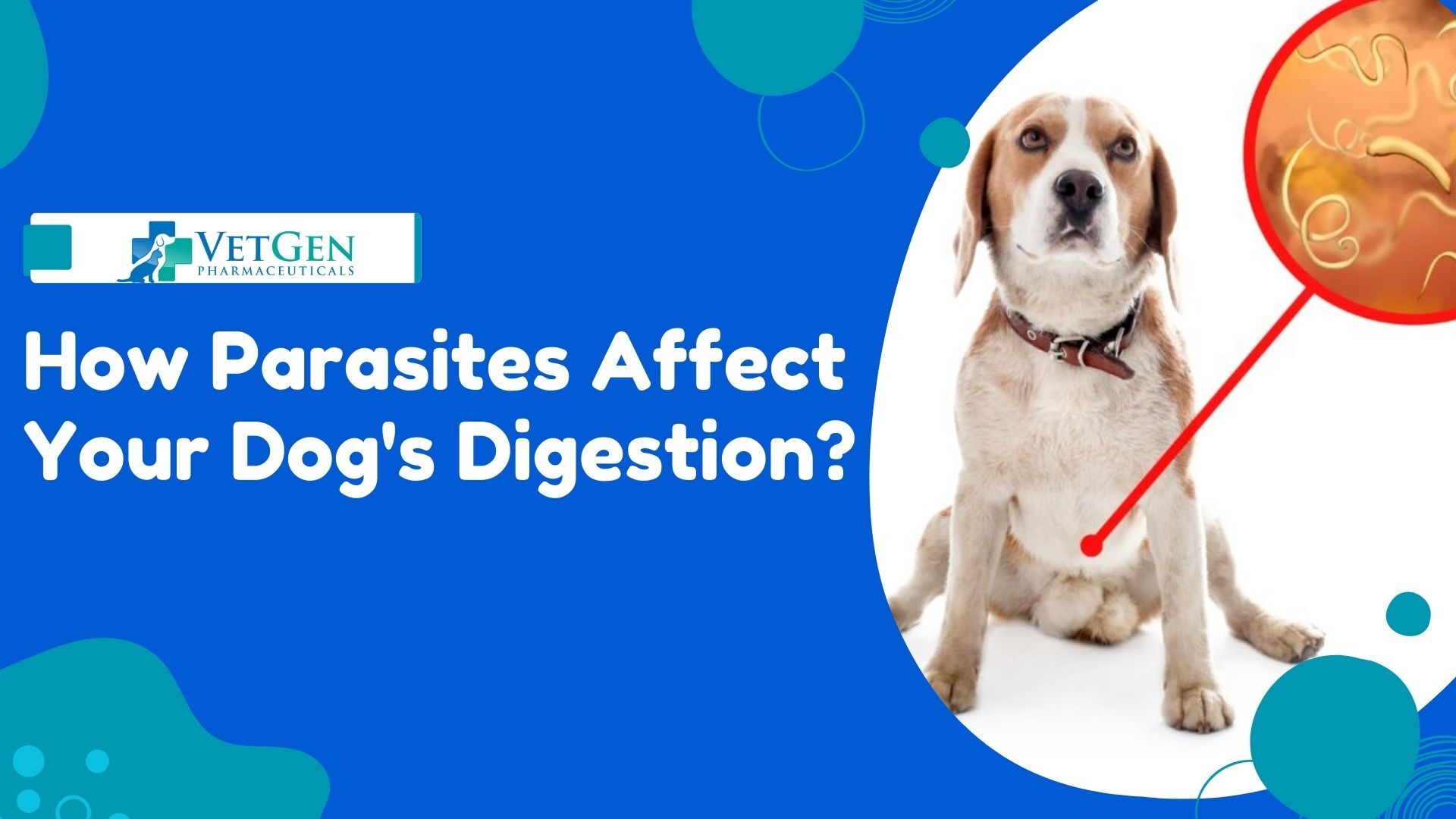Table of Contents
As a dog parent, it’s important to look at the different issues that will affect your dogs, take necessary preventive measures and know about the wide range of treatment procedures available. One such important issue to understand is parasites which possess a very common disturbance and concern for dog parents.
Intestinal parasites aka digestive parasites mostly affect the digestive tract of the dog and can lead to several issues. Here’s a blog that will help you understand how these parasites affect the digestive system, the symptoms to watch out for and how you can prevent them.
General Effects of Parasites on the Digestive System
The intestinal parasites have bad effects on the digestive system of our pups and cause them several discomforts. While many of these are not very dangerous, they still make dogs unhealthy and dogs unhealthy and sick. Here are a few effects that these parasites may cause and their symptoms.
Malnutrition
When parasites affect your dog, they consume the pup’s nutrients and lead to malnutrition.
Irritation
Many parasites can cause inflammation and irritation to the dogs as they may attach to the intestinal walls of the dog and cause issues. Over time, this may cause chronic gastrointestinal issues.
Diarrhea
Parasites also lead to diarrhea in dogs as they disrupt the normal cycle of digestion and can absorb food and nutrients.
Dehydration
Just like diarrhea, the parasite infection will also affect the water content in the body, leading to dehydration. This will make the dog tired and sluggish, without their usual energy.
Anaemia
Parasites also feed on blood, making the results even more dangerous. Therefore, it can make the dog feel anemic and sick.
How Does a Parasite Enter the Dog’s System?
A parasite may enter the dog in different ways like contaminated food or water and infected fleas in dogs. Here is a detailed explanation of ways through which a parasite may enter the dog’s system.
Contaminated food or water
Most intestinal parasites enter the dog’s system through contaminated food or water. When the pups just take such contaminated food, it leads them to have more infections. This will lead to issues like Giardia and Coccidia. It is important to ensure the food you get is proper and hygienic.
Infected Prey
Just like food, when the dogs consume infected fleas or prey, the parasites will be transmitted. It could be as simple as dogs swallowing a flea while grooming or eating an infected rodent. Therefore, it is important to monitor your pup always and ensure they are clean and hygienic.
Skin Penetration
Once you take care of the food, water and grooming habits and hygiene of the dog, the next is to ensure that they roam around in safe places. It is because the next method through which a parasite like hookworms may enter is through the skin. When the dogs walk on contaminated soil, the worms can enter their skin through their paw pads.
PS: Some parasites can also be passed from the dog mother to the puppies through milk during nursing and even through the placenta before birth. The common parasites of that kind are roundworms and hookworms.
General symptoms of parasites
Watch out for these symptoms to know that the dog is affected by intestinal parasites. Here are very common symptoms.
- Diarrhea
- Weight loss
- Vomiting
- Weakness and tiredness
- Lethargy
- Anemia
Is There a Way to Prevent it?
Since parasites can enter the dog’s body through various methods, you need to follow a set routine to prevent these infections and maintain your dog’s health.
- Flea Control: Using flea preventive medicines year-round is crucial because fleas can spread tapeworms.
- Deworming: Particularly for pups, adhere to your veterinarian’s advice for routine deworming treatments.
- Clean Living Environment: Regularly clean your dog’s living area and pick up feces promptly to limit the danger of contamination.
- Fresh clean water: Is essential for your dog’s health. Don’t let them drink from stagnant water sources since they may have parasites like Giardia.
- Frequent Veterinary Checkups: Fecal examinations performed regularly can identify parasites before they pose a serious health risk
Know About The Parasites That Affect Your Dogs
There is no one type of parasite that is harmful to your dogs. There are several worms that can affect your dog’s health. Here are a few parasites to know about.
- Roundworms – Roundworms are the most common parasites that harm dogs, especially puppies. They feed on partially digested food and multiply in numbers, causing more digestive issues in dogs. Sometimes, it might cause life-threatening conditions.
- Hookworms – Thread-like parasites, these hookworms are small parasites that feed on dogs’ blood and can cause blood loss, anemia and other issues. Sometimes, hookworms also cause irritation.
- Tapeworms – Tapeworms are long, flat worms and they absorb the nutrients that the dog consumes. They are less harmful than the above-mentioned parasites but can still lead to itching, scooting, mild digestive discomfort and others.
- Whipworms – Whipworms, as their name suggests, are in a whip-like shape and affect the large intestine of the pups. They lead to weight loss, chronic diarrhea and also dehydration. These issues need to be addressed immediately and could prove to be life-threatening.
Other Worms
The other lesser-known worms that might affect your pup are Giardia and Coccidia. These can cause digestive issues as they attach themselves to the intestinal lining and can lead to diarrhea.
There is a lot you have to do as a dog parent to ensure your pups are safe. That said, don’t fret. Having a clean environment, helping your dogs eat a balanced and healthy diet and ensuring there are routine vet checkups are enough to help prevent and treat any sickness and let the pups be healthy and happy.
Frequently Asked Questions
1. Are there times when dogs may not show symptoms of sickness?
Yes, during the early stages, dogs may not show many symptoms in the early stages. Since it will not be obvious on most occasions, do regular checkups with vets.
2. What are the simple routine methods to prevent parasite infection?
You can protect your dog by taking regular vet care, maintaining proper hygiene, ensuring the food is safe, and other methods that make the environment clean and healthy.








